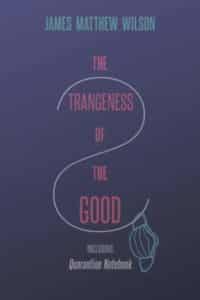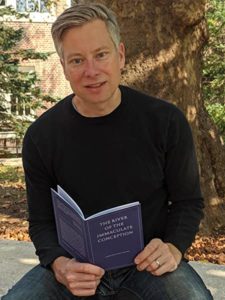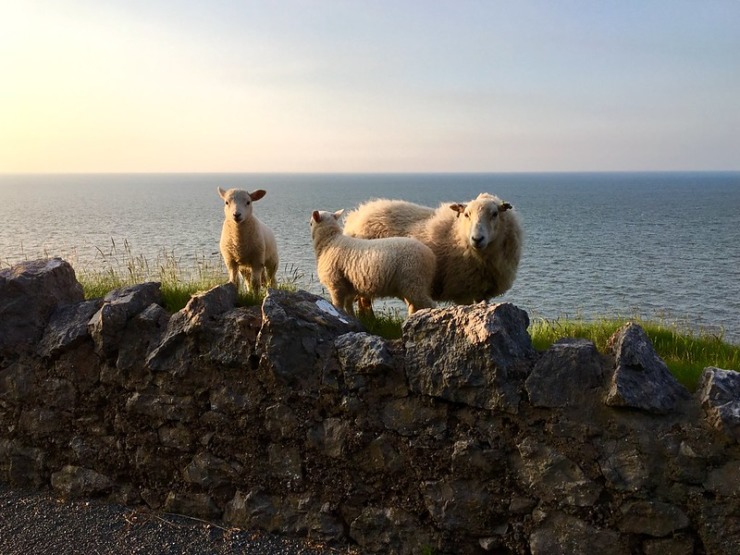Reading the poems of James Matthew Wilson leads one to consider the things that matter in life. It’s an exercise in calming the emotions and quieting the soul. Wilson celebrates the permanent as opposed to the transitory; one learns more about our common humanity by reading “The Wife of Bath’s Tale” from The Canterbury Tales or a play by Shakespeare than looking at any tweet on Twitter, photograph on Instagram, or post on Facebook. (The exception may be TikTok, where we can demonstrate our common humanity by illustrating just how ridiculous we’re willing to look.)
What matters to Wilson, as explored in his poetry? Family. Children. Tradition. Heritage. A good name. Faith. Work. Responsibility. The wonder of creation. Even something as mundane as the routines that structure our lives.
All of these ideas and themes are found in his latest poetry collection, The Strangeness of the Good. The 46 poems include 15 composed in March through May of 2020, during the first COVID-19 quarantine period. Even these, which express the concern and frustration of lives completely disrupted, share with the other 31 something profound—looking for the good, no matter how difficult, no matter how bad things may look. The good is there; the good has always been there.
In “Imitation,” for example, Wilson considers, without naming it, the very contemporary idea of the person as a completely autonomous agent, unbound by rules, laws, traditions, or social mores. Contrary to John Donne, we like to think of ourselves as completely independent islands. The poem goes back to something very basic, which undercuts that notion of total autonomy.
Imitation

To preach that man was born alone
And died that way, in somber tone,
As if no one could know one’s passion.
Yes, dreary in our solitude,
We sit propped on our wooden chair
Our thought, our anguish, every care
Trapped at an airless altitude.
But was it ever so, this posing?
The infant in his mother’s lap
Already imitates her tap
Of heart, her self himself composing.
And all our thoughts are woven from
Threads bare with crossing times before,
We tread upon an earthen floor
Mounded by prints already come.
And though shales piled high as a cairn
May seem locked in their loneliness,
Aspens too stiff and mute to bless
The neighboring boughs for which they yearn,
Their roots are tangled in the deep,
Their weight is pressing all to one;
And that is less than we have done
Who, at another’s pain, will weep.

James Matthew Wilson
Wilson, an associate professor of literature and religion in the Department of Humanities and Augustinian Traditions at Villanova University, is both a poet and a poetry critic. His poems and articles are published in such magazines and journals as The New Criterion, Front Porch Republic, Hudson Review, Raintown Review, The Weekly Standard, Dappled Things, and other literary and political publications.
He’s published eight books, including his first full-length poetry collection, Some Permanent Things; The Catholic Imagination in Modern American Poetry (2014); The Fortunes of Poetry in an Age of Unmaking (2015); and The Vision of the Soul: Truth, Goodness, and Beauty in the Western Tradition (2017). The Hanging God: Poems was published in 2018.
When a poet writes of the things that matter, there’s also an implied responsibility: things that matter deserve to be defended. The Strangeness of the Good does more than defend them. It celebrates them.
Related:
Poets and Poems: James Matthew Wilson and The Hanging God
Poets and Poems: James Matthew Wilson and Some Permanent Things
Photo by cattan2011, Creative Commons, via Flickr. Post by Glynn Young.
__________________________

“I require all our incoming poetry students—in the MFA I direct—to buy and read this book.”
—Jeanetta Calhoun Mish
- Poets and Poems: Paul Pastor and “The Locust Years” - June 26, 2025
- What Happened to the Fireside Poets? - June 24, 2025
- “What the House Knows”: An Anthology by Diane Lockward - June 19, 2025

Leave a Reply